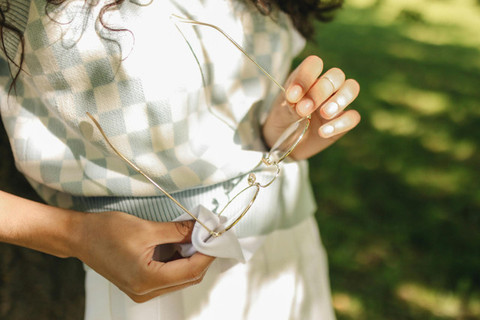How To Clean Anything Off Your Glasses
Smudges, streaks, lint, mystery spots—your glasses see it all. Whether it’s a splash of cooking oil, a stubborn smudge of makeup, or something even stickier, your lenses can collect more than just dust. Keeping your glasses clean isn’t just about aesthetics; it’s about protecting your lenses and preserving clear vision.
If you’ve ever wondered how to clean something odd (or surprisingly stubborn) off your frames or lenses, here’s your go-to guide for handling just about anything.
Everyday Smudges and Fingerprints
The most common culprit is oil from your hands. When you touch your lenses, which often happens when you put them on or take them off, fingerprints and streaks appear fast. To clean them effectively, rinse your glasses under lukewarm water to loosen any debris. Then use a soft, clean microfiber cloth to gently wipe the lenses in circular motions. Avoid using your shirt or tissues because they can scratch the surface over time.
Dust and Pollen
Dust and fine particles may seem harmless, but they can scratch your lenses if rubbed in. Always start by rinsing your glasses thoroughly under a gentle stream of water. This helps remove loose debris. After rinsing, use a microfiber cloth to pat them dry. Don’t skip the rinse—dry wiping is one of the quickest ways to damage your lenses.
Makeup and Skincare Products
Foundation, sunscreen, or setting powder can easily transfer to your frames and lenses. If you see cloudy smudges or a tacky film, rinse your glasses under warm water and gently clean the lenses with your fingertips. Pay attention to the nose pads and frame edges, where product tends to build up. Dry thoroughly with a microfiber cloth, and try to keep your glasses in a case while applying makeup in the future.
Food Splatter and Greasy Film
It happens—one bite of a sizzling burger, and suddenly your lenses are dotted with oil. Grease can spread if you try to wipe it off immediately. Instead, rinse your glasses under warm water, then use gentle, circular motions with your fingers to break up the residue. After that, dry them with a lint-free cloth. For thick splatter, you may need to repeat the process to completely remove the film. Some people also swear by using dish soap to break up the grease between rinses.
Sticky Residue Like Tape, Stickers, or Sap
Adhesive residue is tricky. The key is patience, not pressure. Start by soaking the affected area in warm water for a few minutes to loosen the residue. Then gently rub with your fingertips or a soft cloth. Avoid scraping with fingernails or metal objects, which can damage lens coatings. You may need to repeat this process, as some sticky messes take a few tries to fully disappear.
Paint, Glue, or Craft Materials
If you’ve accidentally gotten paint or glue on your glasses, how you clean them depends on the material. Water-based paint can usually be removed with warm water and gentle rubbing. For dried or oil-based substances, don’t use nail polish remover or harsh solvents because they can ruin the lens coating. Instead, soak the area with warm water and take your time. If it doesn’t budge, bring your glasses to an optical shop for help.
Pet Hair, Lint, or Fabric Fibers
These often hide in the creases around the lenses or cling to the frame. To remove them, rinse your glasses with water and use a microfiber cloth to catch the fine fibers. For tight corners, use a dry, soft-bristled brush like a clean makeup brush or toothbrush. Avoid using tape or sticky rollers, which can leave residue behind.
Salt or Mineral Buildup
After a beach day or sweaty workout, you might notice a white film or gritty residue on your glasses. That’s salt or mineral buildup. Rinse thoroughly with warm water to dissolve the deposits, then let the glasses air dry or pat gently with a microfiber cloth. Avoid hot water, which can damage lens coatings or frame materials.
Fog or Residue from Face Masks
Extended mask wear can cause foggy lenses or leave a stubborn film on the inside. To clean it off, rinse your glasses under lukewarm water and wipe gently with a microfiber cloth. Make sure to clean both sides of the lenses, as residue from breath tends to collect on the inside surface.
When to Let the Pros Handle It
Some issues can’t be fixed at home. If your lenses are scratched, frames are bent, or chemical damage has occurred, it’s best to take them to an optician. Trying to fix these problems yourself can make them worse. Optical professionals usually have the tools to clean and restore your glasses safely.
Keep Your Vision Clear with a Fresh Pair
Even with great care, every pair of glasses reaches the end of its lifespan. If your current pair is scratched, warped, or simply beyond saving, it might be time for an upgrade. Explore WebEyeCare’s full selection of glasses to find your next perfect pair that is stylish, durable, and ready for whatever life throws at your lenses.
 Save yourself from getting into rush hours and buy your contacts online.
Save yourself from getting into rush hours and buy your contacts online.






